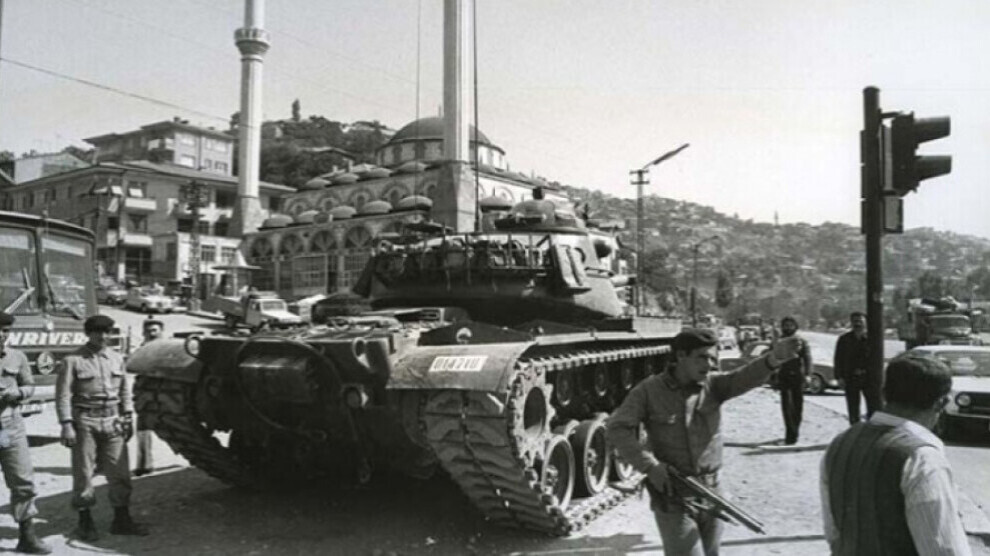12 September 1980, a never ending military coup
Today marks the 44th anniversary of the 12 September 1980 military coup.
Today marks the 44th anniversary of the 12 September 1980 military coup.

Confederation of Revolutionary Trade Unions (DISK) Istanbul Regional Representative Asalettin Arslanoğlu, one of the witnesses of the 12 September 1980 military coup, said that lawlessness has increased in the 44 years since the coup.
On 12 September 1980, a National Security Council which brought together the chief of General Staff, general Kenan Evren, and chiefs of staff of army and security forces took power by proclaiming a state of siege throughout the country. Politicians, from Ecevit to Demirel, Erbakan, Turkes are arrested, the National Assembly is dissolved and the activities of associations and trade unions are banned. The junta extends to a retired admiral, who becomes Prime Minister, Bulent Ulusu.
In the eight and a half months that followed the massacre of Maraş, in late December 1979, there were at least 3856 dead. That of 12 September 1980 was the third coup in Turkey in thirty years. The first was that of May 27, 1960, the second that of March 12, 1971. Between 1971 and 1984, violence and repression against the Kurds and against the left reached its peak. A generation is essentially destroyed.
Arslanoğlu, who was a member of the Revolutionary Communist Party of Turkey (TDKP) in 1980, was a student at the Istanbul Construction Vocational High School when the coup occurred.
Arslanoğlu told Mezopotamya Agency (MA) that he was held in prison for about a year and a half during the martial law period, and added: "They would tear the newspaper into pieces and give it to us. Because they would cut off the news.
Therefore, we did not know what was happening in Amed and Mamak [jails]. However, we could more or less guess what was happening from the treatment we were subjected to. In Davutpaşa, all the wards were converted into a cell system. Food was given from the lower porthole of the door, like feeding a cat. It was thought that our human dignity would be violated in this way. There was tremendous torture. The torturers were not human."
Arslanoğlu said: "The number one declaration of the 12 September military junta was 'the military army seized power', and the number two declaration was 'DISK's strikes are banned'. Therefore, 12 September was a coup targeting the organized struggle of the working class, carried out to establish neoliberalism in Turkey.
So, was it successful? In my opinion, it was successful. If the retired working class says 'I can't get anything' today, the reason for this should be sought on 12 September. With the 12 September coup, the strike law, the union law and the collective agreement law were put into practice."
Arslanoğlu said: "As someone who lived through the coup , I can say that there is a much clearer lawlessness today. Because back then there was an effort to comply with and make up laws and regulations. Today, there is no such thing. Back then, for example, a general, the head of the junta, would choose certain people and make up sentences in courts, looking for their procedures and give them punishments, whereas today I can clearly say that we are experiencing a completely irregular junta process where everything changes and is changed as soon as a single person gives an order, and arrests and tortures continue."
The tragic outcome of the 12 September coup:
650,000 people were under arrest.
1,683,000 people were black-listed.
230,000 people were tried in 210,000 lawsuits.
7,000 people were recommended for the death penalty.
517 people were sentenced to death.
50 of those given the death penalty were executed (26 political prisoners, 23 criminal offenders and 1 Asala, an Armenian militant).
The files of 259 people which had been recommended for the death penalty, were sent to the
National Assembly.
71,000 people were tried by articles 141, 142 and 163 of the Turkish Penal Code.
98,404 people were tried on charges of being members of a leftist, a rightist, a nationalist, a conservative, etc. organization.
388,000 people were denied a passport.
30,000 people were dismissed from their firms because they were suspects.
14,000 people had their citizenship revoked.
30,000 people went abroad as political refugees.
300 people died in suspicious circumstances.
171 people died of torture.
937 films were banned because they were found objectionable.
23,677 associations had their activities stopped.
3,854 teachers, 120 lecturers and 47 judges were dismissed.
400 journalists were recommended a total of 4,000 years imprisonment.
Journalists were sentenced to 3,315 years and 6 months imprisonment.
31 journalists went to jail.
300 journalists were attacked.
3 journalists were shot dead.
300 days in which newspapers were not published.
303 cases were opened against 13 major newspapers.
39 tonnes of newspapers and magazines were destroyed.
299 people lost their lives in prison.
144 people died in a suspicious way in prison.
14 people died in hunger strikes in prison.
16 people were shot while fleeing.
95 people were killed in combat.
Turkey suffered various military coups: 27 May 1960, 12 March 1971, 12 September 1980, 17 April 1993, 28 February 1997, 27 April 2007. In the past years, this process of soft coups has been continuing under Erdoğan, and included an "attempted" coup in 2015 which provided Erdoğan with the best "excuse" to send to prison thousands of opposition politicians and activists as well as "purging" the army, the police, schools, universities.